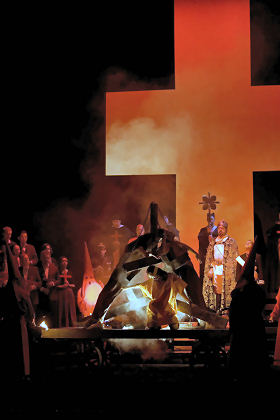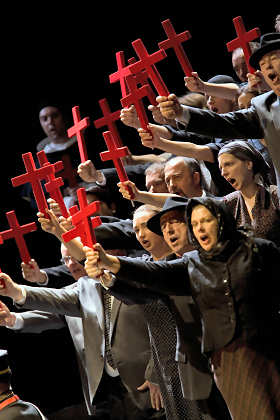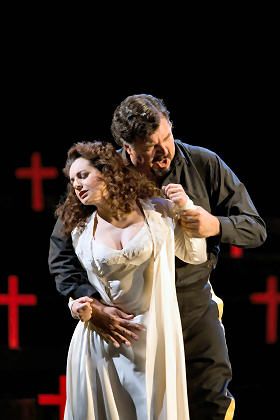|
Editor:
Marc Bridle
Webmaster: Len Mullenger
|
Seen and Heard Opera
Review
After being mooted for ten years, Welsh National Opera's new Don Carlos turns out as a something of a mixed blessing, though its vices are outweighed by virtues. The staging is as complete as it could be and inserts several extra scenes - including the opening chorus that Verdi cut from the Paris premiere in 1867 - into the five-act Modena version of the score. Sung in French, it offers almost four hours of music, some of the finest Verdi available, crafted with self-evident affection by Carlo Rizzi and his team.
Most of the problems are with the production and designs. Theatre director John Caird (in this, his first attempt at opera) has opted for a sense of timelessness rather than historical realism and tries to draw out parallels between Inquisition-ridden Spain and succeeding eras of oppression. The attempt fails however because of heavy-handed over-emphasis since Carl Friedrich Oberle's costumes deliberately accentuate the anachronisms of the Schiller poem on which the opera's libretto was based. They miss the mark badly and result in a stylistic hotch-potch that confuses rather than clarifies. Carlos and Rodrigue for instance, wear long 'operatic' overcoats to signal their revolutionary ideals, the peasants of war-torn France look as though they have been dressed by Matalan while the nobles come straight from The Prisoner of Zenda. King Philippe's jackbooted guards and jailers (bad guys all) wear banana-republic military uniforms complete with shades and assault rifles. We can tell who the characters are by their costumes right enough: but when they are supposed to be and how their behaviours (or their relationships) might span several centuries of cultural change both become puzzling issues.
Heavy handedness is evident in the set designs too. Monty Python notwithstanding, everybody expects the Spanish Inquisition in Don Carlos and Johan Engels' sets make doubly sure that we get it. Black or red crosses are literally everywhere: giant black ones hang from the grid in the first scene for example, in which smaller ones also double as fuel for the peasantry's fire. And while the priesthood should obviously wear crucifixes, there are even more crosses planted strategically around the semi-circular black arena that forms the centre-piece in all scenes throughout the production. That's by no means the end of it though: the pyre in the auto da fé scene is built from crosses, the angry crowd brandishes crosses at every turn and a large fiery cross appears in the stage backdrop. The hammered-home symbolism, such as it is, can make a person tetchy. Or even (pardon me) a little bit cross.
Musically, it is obvious that Carlo Rizzi loves this score. After a somewhat shaky start on Saturday, his reading gained assurance progressively as the performance went on, so that orchestral playing improved to become polished and engaging: Verdi of the first rank in fact, by Act 3.
WNO stalwart Nuccia Focile was in good form as Elisabeth and American Scott Hendricks made a fine, virile (though rather light-voiced) Rodrigue. Theirs were the best performances of the evening, due to combined musical skills and acting ability. Neither was unduly hampered by the shortcomings of the direction unlike the other principals. Guang Yang's Eboli for example - though sung as well as her status as winner of 1997's Cardiff Singer Of the World could lead anyone to expect - might usefully have been portrayed much more expressively. Just what sort of a woman she was meant to be was always in some doubt here, particularly after she trotted off meekly to a convent, banished by Count Lerma in one of the extra scenes.
In the same way, both Paul Charles Clarke (Carlos) and Andrea Silvestrelli (Philippe II) seemed to be having trouble deciding which elements of their roles should be the most prominent. Mr. Clarke's tenor is adequate enough for Carlos but the requirement that he should constantly emphasise his 'feminine' side - a modern invention if ever there was - limits his performance. He almost faints away during the 'Friendship' duet and so feels simply too unmanly to be a convincing saviour of the Flemish despite his affirmed intentions. Mr. Silvestrelli's Philippe II also lacked depth of characterisation: he came across mostly as a booming bully and he too was almost reduced to tears while hugging the jewel case in which Elisabeth had concealed Carlos's portrait. Not much anguished nobility there, I thought.
The great failing of this production is that despite John Caird's honest intention to make it relevant to modern times - because the menace of the Inquisition is still with us one way or another - it simply isn't either frightening or complex enough to reveal much of the the bleak drama that Verdi intended. Musically it's still a masterpiece though - and truly grand opera at that - with fine orchestral playing and the customary excellent singing from the WNO chorus. These things - together with some fine singing from some of the principals - make seeing it more than worthwhile.
Bill Kenny Pictures
© Bill Cooper 2005
Back to the Top Back to the Index Page |
|
||
|
||||





